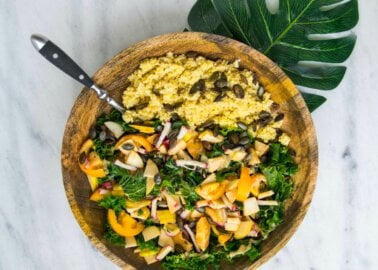How ‘Seaspiracy’ Blows the Lid off the Fishing Industry
Here’s one of the most shocking things that folks are learning from Netflix’s Seaspiracy: if you wouldn’t eat shark fins or dolphins, you shouldn’t eat tuna or shrimp. The reason why? One word euphemism: “by-catch”.
 Seaspiracy
Seaspiracy
What Is ‘By-Catch’ and Why Is It a Problem?
The fishing industry clings to the term “by-catch”, just as it tries to maintain that it “harvests” animals – even though we know that, in reality, they’re being slaughtered.
“By-catch” is the fishing industry’s shady, evasive way of referring to its hundreds of thousands of overlooked victims: the dolphins, sharks, sea turtles, whales, octopuses, rays, seals, birds, and other “non-target” species who are caught or become entangled in fishing nets – like those targeting tuna or shrimp – and are discarded or left to die.
“One of the most shocking things that most people don’t realise is that the greatest threat to whales and dolphins is commercial fishing. Over 300,000 whales and dolphins are killed every single year as ‘by-catch’ of industrial fishing.”
– Sea Shepherd captain Peter Hammarstedt in Seaspiracy
Seaspiracy director Ali Tabrizi says the following:
“[U]p to 40% of all marine life caught gets thrown right back overboard as ‘by-catch’, and most of them die before they even hit the water.”
You’ve likely heard of the annual dolphin slaughter in Taiji, Japan. After watching Seaspiracy, you’ll realise that Taiji is just the tip of the iceberg – if you eat fish, you’re funding dolphin slaughter, too.
According to Seaspiracy and Sea Shepherd, for at least the last 30 years, up to 10,000 “by-catch” dolphins have been killed every year off the French Atlantic coast – that’s more than 10 times the estimated 740 dolphins who were reportedly killed in last year’s hunt in Taiji. Now extrapolate from these statistics and consider how many dolphin deaths are caused by fishing worldwide. If you shed tears for the majestic cetaceans slaughtered in Japan’s infamous killing cove, examine your conscience and extend your compassion to all dolphins and other animals: please, stop eating fish.
Fishing nets – especially trawl nets – don’t discriminate: tuna, shrimp, dolphins, and sharks are all caught and killed in them. Like dolphins, many species of shark are threatened – and some are even on the brink of extinction – all because of some humans’ penchant for eating other fish.
“[E]ating fish is just as bad if not worse than the shark-finning industry, because the shark-finning industry is strictly held in Asia, whereas everyone around the world is eating fish,” says shark activist Paul de Gelder in Seaspiracy. According to Tabrizi, “[A]t least 50 million sharks are caught in nets” as “by-catch”.
‘By-Catch’: There’s Nothing Accidental About It
The fishing industry’s way of dealing with “by-catch” is by deceiving the public.
Hammarstedt explains the euphemisms used:
“The [fishing] industry will call ‘by-catch’ ‘accidental take’, but there’s nothing accidental about ‘by-catch’. It’s factored into the economics of fishing.”
Then, the industry gets others to bluewash for it by using labels such as “dolphin-safe”.
Is ‘Dolphin-Safe’ Tuna Really Safe?
To understand “by-catch” and the internationally recognised “dolphin-safe” seafood label, Seaspiracy turns to a fishery in Iceland. Within one month, this “one little fishery in one little part” of the country caught 269 harbour porpoises, roughly 900 seals, and around 5,000 seabirds, all as “by-catch”. Imagine this carnage on a global scale.
And it gets worse – Tabrizi discovered that the very same fishery had been awarded for its “sustainable” fishing practices. So he did what any vigilant documentarian would do: he took a deep dive into the scandal.
“What about sustainable labels, things like ‘dolphin-safe’ tuna?” Tabrizi asks Hammarstedt.
Hammarstedt confirmed what most of us likely knew all along: just like “organic”, “free-range”, “cage-free”, and other deceptive buzzwords used to market meat, eggs, and dairy, the “dolphin-safe” tuna label is meaningless. “[W]e realize that labels often obscure what’s really happening at sea,” Hammarstedt – who is privy to what’s really happening on fishing boats – told Tabrizi.
In one instance, Hammarstedt’s colleagues apparently encountered tuna fishing vessels that had slaughtered 45 dolphins in order to catch eight tuna – these vessels were supplying fish for “dolphin-safe” canned tuna.
In one particularly eye-opening Seaspiracy interview, Mark J Palmer of the Earth Island Institute – the organisation behind the “dolphin-safe” logo – confesses something shocking to Tabrizi about the authenticity of “dolphin-safe” tuna. Palmer candidly admits to a mind-blowing conflict of interest between the companies and organisations that dole out “dolphin-safe” and related labels and the very fishing operations that they’re meant to be overseeing. To catch the interview that’ll surely change your mind about eating fish, you’ll have to queue up the popular new documentary on Netflix.
The only truly dolphin- and tuna-friendly product is one that’s vegan.
What About Fish?
Even though fish and other sea animals are capable of feeling pain and suffering, they’re usually killed with absolutely no regard for their welfare. When pulled from the ocean’s depths, they undergo excruciating decompression – the internal pressure causes their swim bladders to rupture, pops their eyes out of their heads, and pushes their stomachs out through their mouths. Many slowly suffocate on fishing vessels, while others are still alive and thrashing when their throats and bellies are slit open.
Fish are beautiful and fascinating animals with individual personalities. Researchers have found that fish recognise each other and gather information by eavesdropping. They’re capable of remembering past social interactions that they’ve had with other fish, and some show affection by rubbing against one another. They value their lives and don’t want to die. Eating fish is unnecessary and supports an industry that is the biggest killer of animals in the world.
What You Can Do
To take action to protect our oceans, order our free vegan starter kit, which is packed full of recipes, tips, and advice, including information on plant-based nutrition and ideas for quick and tasty vegan meals. You can also check out our guide to the vegan fish products available in the UK that will give you that “fishy” taste without harming any animals.



